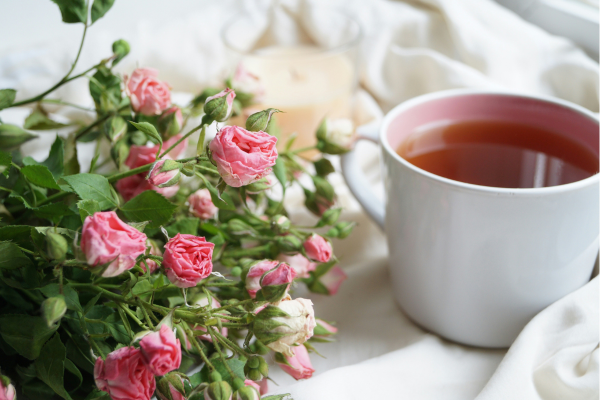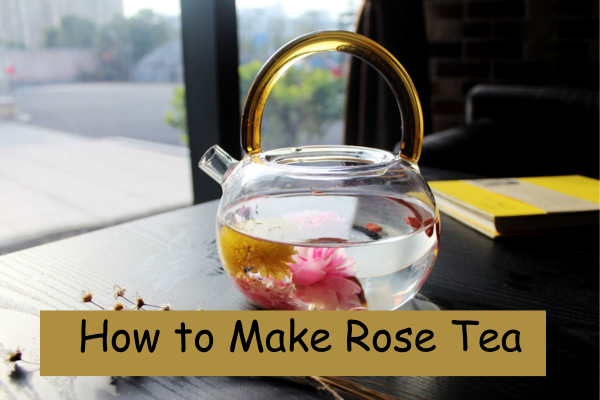Looking For the perfect yet simple recipe over the web, here it is the one stop for everything you would want to know from rose tea benefits to how to brew rose tea.
Rose tea, a timeless herbal infusion known for its delicate aroma and subtle flavour, has been cherished for centuries across various cultures. This enchanting beverage is not only a treat for the senses but also offers a range of health benefits. In this comprehensive guide, we will explore the art of making rose tea, from selecting the right roses to brewing the perfect cup. Join us on a fragrant journey as we dive into the world of rose tea.
Introduction to Rose Tea
In the world of teas, one fragrant herbal concoction stands out - rose tea. It's not just a beverage; it's a sensory experience, capturing the essence of delicate roses in every sip. Unravel the significance of rose tea, exploring its origins, simplicity, and the subtle magic it brings to teacups around the world.
Rose tea, with its roots deeply embedded in ancient civilizations, has emerged as a beverage of historical and cultural significance. The discovery of the tea-making process, intricately linked to culinary exploration, reflects a fusion of diverse tea cultures shaped by trade routes and regional preferences. As a therapeutic elixir, its historical use in traditional Chinese medicine and Ayurveda underscores its perceived benefits in digestion, skin health, and emotional well-being. In formal settings, rose tea has adorned courtly gatherings and ceremonial rituals, embodying elegance and sophistication. Its timeless journey continues to be a delicate thread connecting traditions, symbolisms, and the simple pleasure of sipping a cup filled with historical resonance.
How to Make Rose Tea?
Before embarking on your rose tea adventure, it's essential to select the right roses. Not all roses are suitable for consumption, so it's crucial to choose varieties specifically cultivated for culinary purposes. Look for organic, pesticide-free roses to ensure the purity of your tea.
Ingredients:
- Dried Rose Petals
- Honey
Simple Rose Petal Infusion:
- Add a tablespoon of dried rose petals to a teapot or infuser.
- Pour hot water over the petals, ensuring they are fully submerged.
- Allow the petals to steep for 5-7 minutes, depending on your desired strength.
- Strain, use a fine-mesh strainer or remove the infuser to separate the liquid from the rose petals. This step ensures a smooth and petal-free tea.
- Customise your rose tea by adding optional ingredients such as honey, lemon, or a cinnamon stick for additional flavour complexity. Experiment to find your preferred combination.
- Enjoy the fragrant infusion on its own.
Ingredients
- Dried Rose Petals
- Black Tea
- Honey (Optional)
Rose and Black Tea Blend:
- Combine dried rose petals with your favourite black tea leaves for a more robust flavour profile.
- Use a ratio of 1:1 or adjust to your preference.
- Steep the blend in hot water for 3-5 minutes, and strain before serving.
- This blend offers a harmonious balance of the boldness of black tea and the floral notes of roses, savour with a few drops of honey.
Health Benefits of Rose Tea

1. Stress Relief:
The aroma of rose tea has natural stress-relieving properties, helping to calm the mind and reduce anxiety. The act of sipping on warm rose tea can create a soothing ritual, promoting relaxation after a hectic day.
2. Digestive Aid:
Rose tea is known for its mild diuretic properties, which may aid in reducing bloating and supporting healthy digestion. The calming effect of rose tea can also help alleviate symptoms of indigestion and discomfort.
3. Rich in Antioxidants:
The petals of roses contain antioxidants that combat free radicals in the body, contributing to overall health and well-being. Regular consumption of rose tea may support a healthy immune system and protect against oxidative stress. The rich antioxidant content in rose tea plays a crucial role in neutralising free radicals, potentially reducing the risk of chronic diseases and promoting overall well-being.
4. Nurtures Skin Health:
Rose tea's mild diuretic properties aid in hydration, promoting clear and glowing skin by flushing out toxins. Additionally, the anti-inflammatory characteristics of rose tea may soothe redness and irritation, offering relief from skin conditions. With vitamin C supporting collagen synthesis, rose tea becomes a holistic addition to skincare, fostering overall skin health. As you make sipping on warm rose tea a soothing ritual, you not only indulge in its delicate flavour but also provide your skin with a natural tonic for lasting vitality.
The calming aroma and gentle ritual of sipping on warm rose tea can alleviate anxiety and induce a sense of tranquillity. Additionally, its mild diuretic properties may contribute to kidney health by aiding in the elimination of toxins. Rose tea is also known for its potential in relieving menstrual discomfort, thanks to its soothing and anti-inflammatory characteristics.
Moreover, the antioxidant-rich nature of rose tea can contribute to heart health by combating oxidative stress and supporting a healthy cardiovascular system.
Final Words
Rose tea, an enchanting infusion with a rich history and cultural significance, captivates not only with its delicate aroma but also through its diverse benefits. From the initial exploration of its origins and symbolic importance to understanding the art of brewing this fragrant elixir, rose tea unveils a world of timeless tradition and well-being. Selecting quality petals and mastering a simple brewing technique are the keys to unlocking the tea's full potential. As the petals steep, they release not only their aromatic essence but also a spectrum of advantages. Stress relief, digestive support, and antioxidant richness are woven into the very fabric of rose tea, making it not just a beverage but a holistic experience that nurtures the body and soothes the soul. With every sip, rose tea becomes a journey from tradition to wellness, offering a fragrant pathway to both cultural appreciation and personal vitality.

